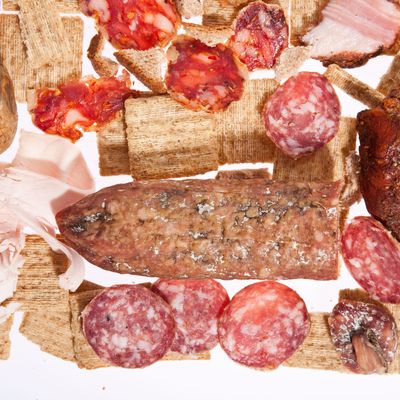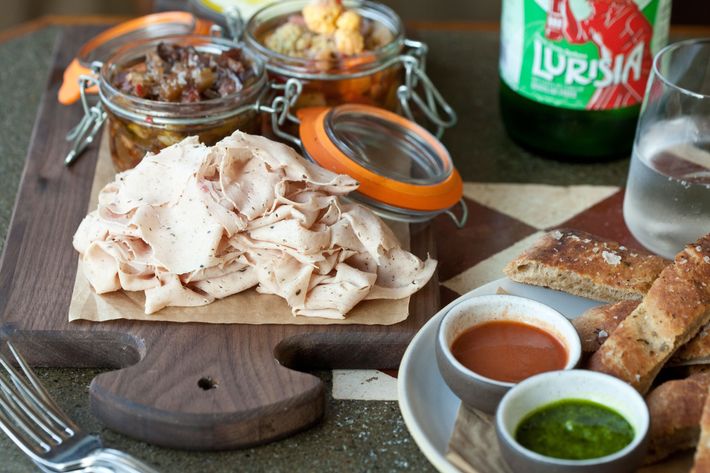
At Chicago’s Salone Nico, the dinner menu’s snacks section includes a charcuterie board with salumi, prosciutto, and mortadella. It’s hardly an outlier. In fact, diners could be forgiven if they’ve hit something of a cured-meat saturation point. Across the country, any restaurant menu that features casual, drink-friendly food (so, all of them, basically) offers at least a few varieties of salumi, either produced in house, flown in from Europe, or made domestically by brand-name producers like La Quercia (in Iowa) or Olympia Provisions (in Portland). It’s easier than ever for Americans to find top-quality prosciutto di San Daniele (and di Parma), speck, saucisson sec, coppa, or soppressata. More and more, however, menus are also featuring cheekily named meats like the Hillbelly, Gin ‘n Juice Salame, or “the Delaware Fireball.” The thing those last three have in common: They’re all made by Smoking Goose, one of the newest and most original and unexpected meat specialists to come around in a while.
Smoking Goose founder Chris Eley admits that there’s no old-world connection for his products, and that he doesn’t come from some generations-long lineage of European butchers: “It’s nothing like that at all.” Instead, Eley is an Indianapolis native who was working in Chicago as a fine-dining sous-chef when he decided he wanted a change. So he moved back to his hometown and opened a butcher shop in 2007, and he started producing small amounts of cured meat, enough to sell at his store and a few local restaurants. By 2010, demand outstripped supply, and he decided to go all in on meat production. The next year, Smoking Goose opened, and Eley began shipping nationwide.
The defining characteristic of Eley’s products is diversity. Instead of specializing in a single product, or a single type of meat, he makes the most of everything that’s available in Indiana. The small team — just 25 people in total — breaks down about 140 whole animals per month, bred at 23 different farms. In addition to pork, Eley uses rabbit, elk, and even lamb frequently, creating things like lamb ham or elk-and-blueberry salami. The group also produces tasso ham and slab bacon in its smokehouse, as well as super-moist smoked turkey that one fan describes as “Boar’s Head Plus.”

“I want to be different,” Eley says matter-of-factly, explaining that authentic Italian salumi sprung up because of what was available in the regions where it’s produced. He’s not interested in re-creating something from another country, and instead says he’s interested in “taking the basic principles of what we’ve learned and applying it here.”
The product that best captures Eley’s gonzo tendencies is something called the Delaware Fireball. Based on a French crépinette, the patty-shaped sausage is made by wrapping finely ground pork in caul fat. It’s seasoned with French pepper, hot paprika, and crushed chiles before being cold-smoked and fermented. The end result is sausage that’s equally forceful with its blasts of heat and funk. It’s unlike any other sausage available in the U.S., and it’s tremendous.
“It’s impressive that they manage to do such a good job with such a diverse product line,” says Aaron Foster, who carries Smoking Goose’s products at his Foster Sundry market in Brooklyn. “And it’s also smart of them to make a bunch of stuff that appeals to a broad range of people.”
Foster is hardly alone in his adoration. Smoking Goose’s products are now for sale at influential markets around the country: In New York, you’ll also find Smoking Goose at places including Astoria Bier and Cheese, Eataly, Bedford Cheese, Marlow & Daughters, the Meat Hook, and even in the Italian combo sandwich at Mekelburg’s. It’s also at Vagabond Cheese in Los Angeles, Michigan’s much-lauded Zingerman’s, and Chicago’s Little Bad Wolf, as well as Salone Nico, which carries the mortadella. (Smoking Goose also regularly posts pictures of restaurant dishes made with its products to its Facebook feed.) But if you can’t get the tasso you’ve been craving, Smoking Goose sells their meats through their own online store.
Chefs are coming around to Eley’s specialties, too. “It’s better than what I’ve had in Italy,” says Albert di Meglio, a Staten Island native who made his name as the chef at Manhattan’s Rubirosa and now runs Barano in Williamsburg. Di Meglio carries Smoking Goose’s mortadella, which tweaks the classic Italian recipe with a healthy dose of cinnamon. High praise for a midwestern product from an Italian-American chef raised in New York, an area that’s not exactly hurting for excellent cured meat. “They’re in Indianapolis — so what?” says di Meglio. “They’re killing it.”





